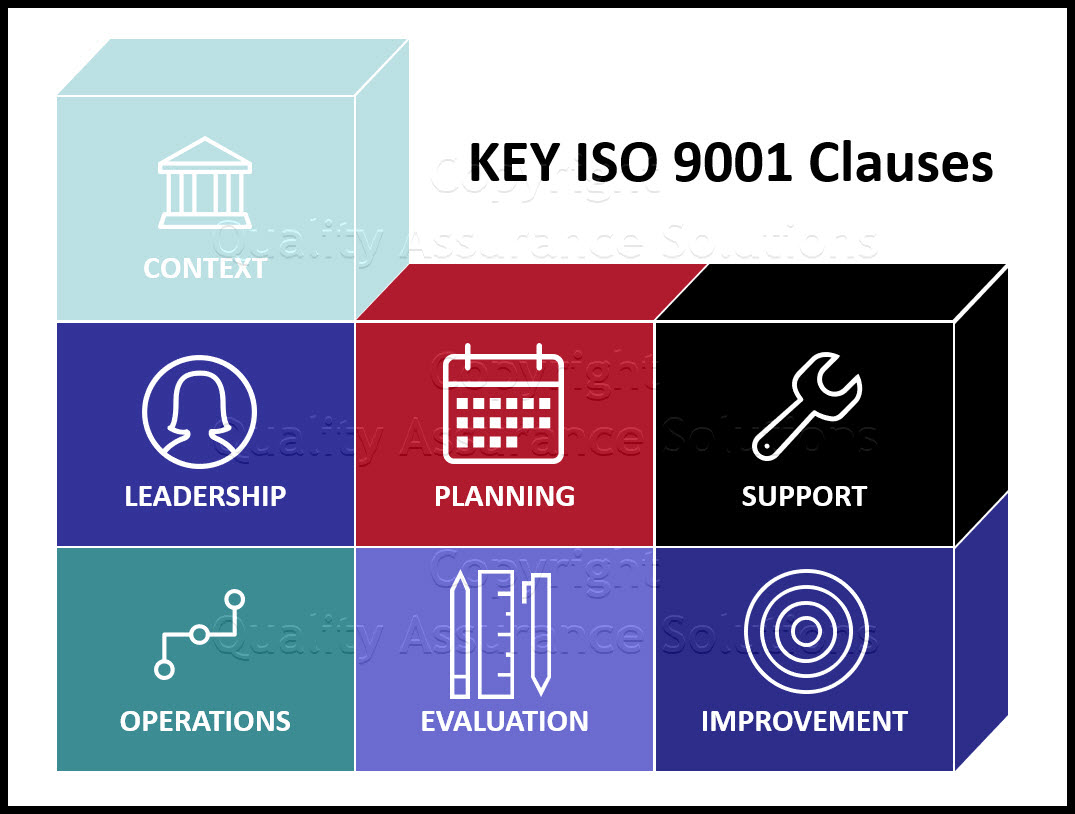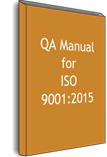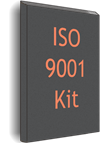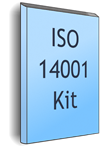9001 ISO Training:
Key Clauses for ISO 9001:2015
No matter your type of business or organization, when implementing all the changes of the new quality management system standard, ISO 9001:2015, you must take this project seriously. From concerns about cost and demonstrating ROI to practical considerations, QMS implementation of the new ISO 9001:2015 requirements requires efforts and commitment by a steering team and strong support by your business leaders to ensure success.
But the process doesn't have to be painful. With proper 9001 ISO training, planning and execution, implementing an QMS system based on ISO 9001:2015 can be a smooth process and quickly improve efficiency across your business. To help with your 9001 ISO training, here we list the changes to ISO 9001:2008. We include some critical QMS implementation best practice tips to consider when implementing or transitioning to the new ISO 9001:2015 standard.
Executive Buy In
You need to get Executive Buy-In and build consensus around your
QMS implementation on ISO 9001:2015. Getting buy-in from company executives
means more than just getting a signature to approve investment in an QMS solution
(though that is certainly important). But it means educating leadership about
the QMS implementation based on how ISO 9001:2015 affects the company. You need to provide 9001 ISO training to your management team.
More than just quality assurance and quality control, the new high level structure ANNEX SL transforms your business. New enhance features include operational planning, risk based thinking and other new “features” like knowledge or QMS change management.
Executives must support these ideas before moving forward with any new QMS deployment effort. Executives must frequently communicate the QMS implementation plans and the changing processes. Vitally, they need to build consensus—and even excitement—across your company.
Your ISO 9001:2015 Kit includes Templates, QA Manual, Implementation Guide and a Gap Assessment Internal Audit Tool for ISO 9001:2015
Realistic Expectations
Implementing ISO 9001:2015 helps streamline processes, improves visibility, reduces costs, and completely changes the way your company does business, but it won't happen overnight. QMS implementation encompasses several new complex strategies to create a great QMS. This takes careful planning and time to execute. To accelerate the implementation process, make sure you scope your QMS implementation project appropriately and consider working with an experienced, knowledgeable quality management expert.

Identifying a dedicated project leader and a team for your QMS implementation ensures the project goes smoothly. For the QMS team members, consider reassigning or removing some of their normal job duties. Allow them to have enough time to concentrate on the task at hand. Identify a team leader with strong project management skills who can facilitate team communication, address any issues that may arise, and keep the QMS implementation on schedule.
Prior to deployment, analyze the best QMS implementation option for your business. Build consensus around the effort. Set realistic expectations. Give your staff the support and 9001 ISO training. These steps take more time, but they result in a more effective QMS implementation experience and better-run operations in the long term.
Minding these best practices smooths your QMS launch, keeps it on the right track throughout the entire implementation or transition process.
Your easy to edit ISO 9001:2015 Quality Assurance Manual.
CLAUSE BY CLAUSE COMPARISON
ISO published the final version of ISO 9001:2015 in September 2015. Companies and organizations worldwide can become ISO certified
against this international standard. Below I breakdown the audit-able clauses. Let's start your 9001 ISO Training...
4. Context
When planning for your quality management system, your organization has to consider the expectations of relevant interested parties and the external / internal factors that affect the ability to achieve the intended results of your quality management system.
4.1 Understand your organization and its unique context
4.2 Clarify the needs and expectations of all your related interested parties
4.3 Define the scope of your quality management system (QMS) and
4.4 Establish a QMS that complies with this standard.
These subjects form part of the ISO 9001:2015 and relates to the organization and its context. It describes how to set up the management system similar in some respects to the old section 4 except that it explicitly requires a broader understanding of the situation and needs of the business. This new clause establishes the context of the QMS and how the business strategy supports this.

5. Leadership
The concept of appointing a management representative is not mandatory anymore. The responsibilities of implementing lie within top management. This particular emphasis places particular emphasis on leadership, not just management as set out in previous standards.
5.1 Provide leadership by focusing on quality and customers
5.2 Provide leadership by establishing a suitable quality policy
5.3 Provide leadership by defining roles and responsibilities.
This means top management has greater accountability and
involvement in the organization’s management system.
Your ISO 9001:2015 Kit includes Templates, QA Manual, Implementation Guide and a Gap Assessment Internal Audit Tool for ISO 9001:2015
6. Planning
What was a planning clause in ISO 9001:2008 (5.4), is now a new major clause titled Planning in ISO 9001:2015.
When planning its QMS, top management must now officially implement and promote a culture of risk-based thinking throughout the company. This determines and addresses the risks and opportunities associated with providing assurance that the QMS can achieve its intended result(s);
6.1 Define actions to manage risks and address opportunities
6.2 Set quality objectives and develop plans to achieve them
6.3 Control changes to your quality management system.
As the goal, you must prevent or mitigate undesired effects. You
must integrate these actions to address these risks and opportunities into your QMS
processes.
Not all processes of a quality management system represent the same level of risk in terms of meeting your QMS objectives. Not all companies are the same, customization must be applied.

7. Support
Planning for HR process controls must include determining all competency criteria, skills evaluation, identification of training needs, types of training, and provision of training. All similar to the old standard.
Communication problems are probably the most common cause of QMS nonconformities
All employees need to know...
- How your company evaluates training effectiveness
- Methods to communicate awareness of the importance of quality requirements applied to meet quality objectives.
7.1 Support your QMS by providing the necessary resources
7.2 Support your QMS by ensuring that people are competent
7.3 Support your QMS by explaining how people can help
7.4 Support your QMS by managing your communications
7.5 Support your QMS by controlling documented information.
This clause specifically discusses monitoring product
and service for conformity. This clause
replaces the old clause 7.6 on Control of Monitoring and Measuring Equipment. The new standard changed the use of the term
“equipment” to the new term “resources”.
Your easy to edit ISO 9001:2015 Quality Assurance Manual.
8. Operations
This clause is the biggest of all the clauses in ISO 9001:2015. The individual planning step in the 2008 version focused on determining how to verify conformity. The ISO 9001:2015 version orients around managing processes so that you achieve state of control even when intended or unintended changes occur.
8.1 Develop, implement, and control your operational processes
8.2 Clarify how you manage product and service requirements .
8.3 Establish a process to design and develop products and services
8.4 Monitor and control externally provided products and services
8.5 Manage and control production and service provision activities
8.6 Implement arrangements to control product and service release
8.7 Control nonconforming process outputs, products, and services.

9. Evaluation
The ISO 9001:2015 places more emphasis on measuring and evaluating how well the QMS performs. Develop, stipulate and reviewed metrics on a regular basis. Include these in the QMS management review process.
ISO 9001:2015 requires you to determine the needs for monitoring and measurement and applying methods for performing / analyzing and evaluating these needs. In short
terms, the company determines
- when to perform the monitoring and measuring
- when to the analyzed and evaluated the results.
9.1 Monitor, measure, analyze, and evaluate QMS performance
9.2 Use internal audits to examine conformance and performance
9.3 Review the suitability, adequacy, and effectiveness of your QMS.
Your ISO 9001:2015 Kit includes Templates, QA Manual, Implementation Guide and a Gap Assessment Internal Audit Tool for ISO 9001:2015
10. Improvement
Opportunities for improvement as phrase is only mentioned in ISO 9001:2008 at clause 5.6.1 (Management Review). ISO 9001:2015 include this in other afflicted clauses as well.
10.1 Determine improvement opportunities and make attempts for improvements
10.2 Control nonconformities and take appropriate corrective action
10.3 Try to enhance the suitability, adequacy, and effectiveness of your QMS.

Documented Information
During the QMS implementation program establish the following QMS documented information as general framework of a cohesive QMS ‘System” with all the detailed document artifacts. Review all for executive and management approval. Incorporate to establish a company wide QSM quality policy, new quality manual baseline and QMS ISO 9001 training baseline.
- Quality Manual –STILL the best “weapon” for keeping all under control as documented baseline with incorporated ISO 9001:2015 requirements that demonstrates how the company meets the new requirements of ISO 9001:2015 with references to all existing and new procedures.
- Quality Policy – High level document that provides a framework for establishing and reviewing the company's quality management strategy.
- Quality Objectives –High level document in which you state the company's QMS objectives and provide a plan for their realization.
- Quality Plan & SOP for Context of the Organization and Interested Parties. This procedure describes the process of determining the context of the organization, identification of interested parties and their needs and expectations.
- Quality Plan & SOP for Risk & Opportunity Management - A continuity & contingency plan & SOP that defines how your company identifies and addresses risks and opportunities related to the quality management system.
- Procedures for Production, Marketing/Sales, Supplier Risk Management, External Parties, etc…
- QMS Records Keeping Plan according to ISO 9001:2015 requirements for records keeping
- Quality Improvement Plan – outlines all strategies of the company for quality improvement.
- QMS Management Review strategic planning template
- Corrective Action / Root Cause Analysis / Nonconformity Reporting Register - A register which hosts tracking of all company wide occurring business interruptions and nonconformities for product and service management. This should also serves as a closed loop risk based preventive management problem solving tool.
Your easy to edit ISO 9001:2015 Quality Assurance Manual.
9001 ISO Training Program
An effective 9001 ISO training program necessarily ensures that personnel who plan, implement, and apply QMS have the skills needed to perform their responsibilities to the QMS. The depth of each employee’s knowledge and skills contributes to the Company’s ability to achieve its mission and customer satisfaction goals. Thus, all personnel must be trained to a level that advances the company’s commitment to the highest level of quality management possible.
New ISO 9001:2015 quality management system requirement training helps institutionalize all the new ISO 9001:2015 quality system requirements through learning, provides guidance on how to comply with all new QMS policies and requirements, and standardizes new quality systems policies.
Article written by Robert Jasper of Art of Quality for Quality Assurance Solutions. Article edited and posted by Quality Assurance Solutions
|
Quality Assurance Solutions Robert Broughton (805) 419-3344 USA |
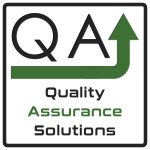 |
|
Software, Videos, Manuals, On-Line Certifications | ||
|
450+ Editable Slides with support links | ||
|
Corrective Action Software | ||
|
Plan and Track Training | ||
|
AQL Inspection Software |
|
Learn and Train TRIZ | ||
|
Editable Template | ||
|
Templates, Guides, QA Manual, Audit Checklists | ||
|
EMS Manual, Procedures, Forms, Examples, Audits, Videos | ||
|
On-Line Accredited Certifications Six Sigma, Risk Management, SCRUM | ||
|
Software, Videos, Manuals, On-Line Certifications |
